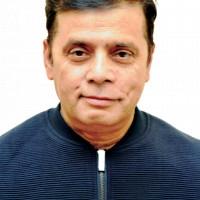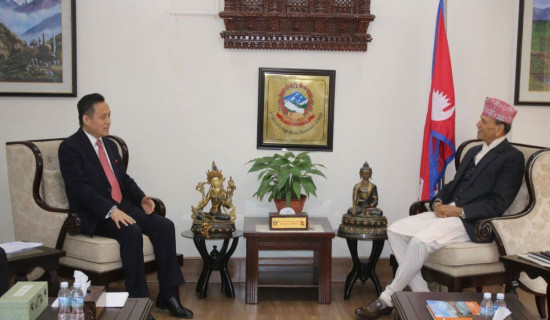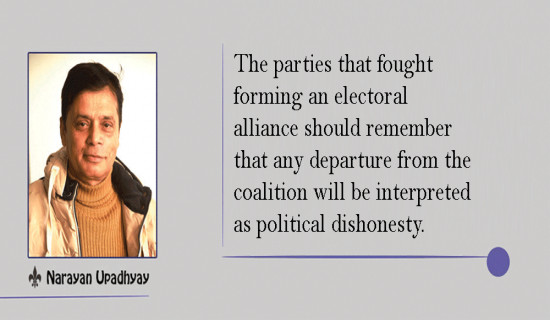- Thursday, 26 February 2026
Republic Has Grown Stronger, Vibrant
Since the 240-year-old monarchy was abolished some one and a half decades ago, skepticism is still rife about whether the republican system will sustain in the country. The cynicism appears to be entrenched in the false notion that Nepal cannot do away with the institution of hereditary monarchy for long. Pro royalists frequently deride our democratic republican and federal system of governance, albeit for no substantial reasons.
Those casting aspersion on the present structure of governance are forgetful of the merits of the governance system that aims at protecting the interests of citizens and helps transform the nation into a developed and prosperous country through true representation of the people at political and administrative institutions.
Epochal Decision
In the meantime, one should be reminded of unsavoury incidents that acted as a catalyst for pulling the plug on the hereditary monarchical system on May 28, 2008. The transition from constitutional monarchy to a republic democratic system was an epochal event in a country where monarchs had ruled their subjects for so long.
When the country was passing through the decade-long Maoist-led bloody insurgency from 1996 to 2006, an unthinkable incident occurred: the then King Birendra, his family members, along with some relatives, were killed in a palace massacre on June 1, 2001, that sent shock waves across the nation and abroad. The massacre paved the way for the late King Birendra’s brother, Gyanendra Shah, to come to the throne. He soon turned himself into an authoritarian king.
The unpopular monarch interfered in government affairs, dissolved the parliament, appointed his handpicked cabinet and tried to rule the country with an iron fist, irking the people and political parties to the hilt. His authoritarian overtures spurred the then outlawed outfit, the Maoists, to join hands with their foes, then seven political parties.
After having reached a deal through the 12-point Delhi understanding, political parties and the Maoists jointly staged the famous 2007 Uprising that brought the authoritative king to his knees. He later acquiesced to resurrecting the dissolved parliament, which, with the Maoists’ participation, became an interim Constituent Assembly. At its very first meeting, CA took a historic decision to terminate the monarchy for good. The task of restructuring the country into federal provinces to empower the people at the grassroots soon followed.
New Era
Monarchy’s termination ushered in a new era in the country as it adopted a new form of governance and the political system. The constitution promulgated by the CA in 2015 institutionalised the new political federal republican system.
The new system has ensured that commoners can become the state heads. It has also guaranteed an inclusive representation at the three-tier system of governance. People hailing from all castes, creeds, groups, genders, and regions started becoming representatives of their people, thanks to the republican and federal system that prioritised inclusivity for safeguarding the interests and welfare of the citizens.
Another milestone the country reached after the monarchy ceased to be was the country was restructured into seven federal provinces, 77 districts and 753 local bodies that saw a greater amount of devolution of power to the people at provinces and grassroots levels. Elections to federal and provincial parliaments elected an eclectic mix of representatives.
The new political system enabled the nation to hold two rounds of local elections and one federal and provincial election, suggesting that the new system has found a strong foothold which in turn helped institutionalise all political gains made after the system’s implementation. In the meantime, all rights enshrined in the new constitution, prepared by the people’s representatives, have made the people the master of their own fate, which was the fundamental idea behind the cessation of the feudal monarchical system that often regarded people as second-rated subjects.
The devolution of power to people at the grassroots and an increased level of the budget coming to these provincial and local governments played a key role in pushing up development endeavours. People have become more aware of their rights and roles. Unlike in the past, almost all provinces have witnessed a rapid growth of infrastructure developments. Roads, hydropower stations, transmission lines, communication networks, health institutions, education centres and several other infrastructures have helped improve the lives of people at all levels.
However, many accuse progress and development have not picked up at the desired pace. Leaders and representatives are often accused of engaging in corruption, nepotism, favouritism and inaction, among others. Their lacklustre performance has given rise to pessimism regarding the new political system. Many leaders and representatives have kept engaging in power struggles and petty individual interests. Many of them have become affluent in a short time. This has done no good in raising many people’s faith in the new governance system.
When parties and politicians are entangled in power politics, it often creates political instability that hinders the country’s development drives and other people-oriented programmes. Nine or ten governments have taken to the helm of the country since the nation became a republic. Moreover, the parliament’s dissolution by the erstwhile majority government of KP Sharma Oli has given rise to the suspicion that his attempts were aimed at derailing the constitution. The accusation that Oli-led governments engaged in rampant corruption even when the pandemic gripped the nation only intensified pro royalists’ cynicism against the new system.
Road Ahead
The petty and self-serving interests of some of our politicians provide pro-royalists with enough fodder to denigrate our republican system. However, given the key political parties’ strong adherence to the republican form of governance and strong backing from a huge number of people, people working for reinstating the monarchy can never realise their dream.
Our leaders and political parties have a greater responsibility to fulfil to make our system strong and vibrant. For achieving this goal, they must refrain from acts that would attract abject criticism.
They must improve their performance as people’s representatives and work for the welfare of their respective localities, provinces and the entire nation. Political parties and leaders will do well to make our democratic-republican system resilient to any eventuality if they continue their efforts to empower people, esnure people’s welfare, prosperity and safeguard the country’s sovereignty, independence and territorial integrity.
(Upadhyay is Managing Editor of this daily)

















